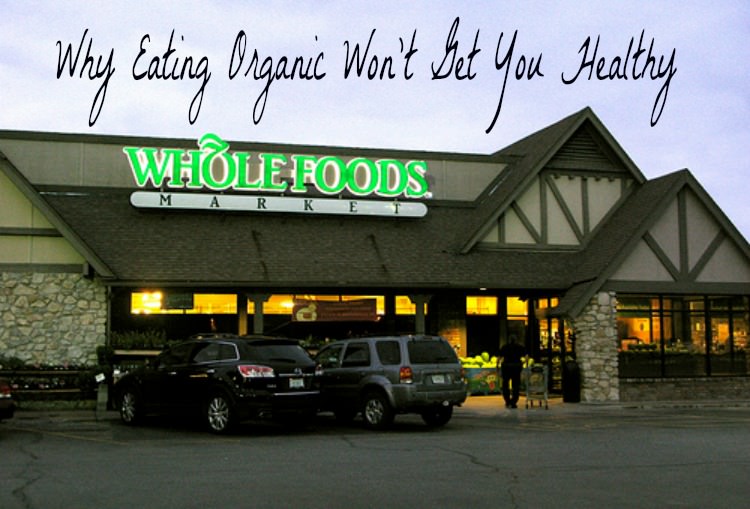
High five!
You’ve made some big changes in your family’s diet recently and are really focusing on eating organic. You’ve stopped buying boxed cereal and other processed snacks at the grocery store and are making homemade snacks and treats with wholesome ingredients instead. You’re even sprouting or soaking nuts and seeds and even your legumes and grains!
You’ve joined an organic fruit and veggie co-op and made the switch to grassfed locally produced meats. You’ve even taken the wise step of incorporating raw grassfed milk into your family’s diet.
While all these changes are wonderful and beneficial compared with how you’ve been eating, I’ve got some tough news for you.
These changes alone are not going to get you healthy.
Eating organic is not the way to health shocking as it may sound!
Gulp.
How can this be, you ask? Your diet is now light years ahead of where it was. How can this organic, whole foods diet not result in vibrant health?
Let me tell you a little story ….
The Telling Tale of the South Sea Islanders
The first Europeans to visit the South Sea Islands in the 1700’s were Captain Cook and his crew. Tahiti was truly a paradise with beautiful people whose frequent smiles revealed perfectly straight, pearly white teeth.
Dr. Weston A. Price found the same blissful environment nearly 200 years later when he arrived with his wife to study these happy, healthy people. Dr. Price noted that the bone structure of the South Sea Islanders was the most perfect of any of the 14 isolated traditional cultures he studied during his travels around the world in the 1920’s and 1930’s which he documented in the amazing book Nutrition and Physical Degeneration.
The traditional diet of the South Sea Islanders was high fat, consisting of seafood and pork with coconut the most important plant based staple. Tropical fruits and other plants were also consumed as there were plenty available in such a temperate and ideal growing climate.
The environment and water were, of course, pristine and food was abundant.
Wouldn’t such an organic, whole foods diet be enough for health?
No, it was not.
The South Sea Islanders knew from observation and perhaps instinct that their clean, whole mixed diet was not enough to maintain their own health or to produce healthy babies and children.
The Sacred Food the South Sea Islanders Could Not Do Without

Despite having plenty of whole, nutrient dense foods available during all times of the year, the South Sea Islanders risked their lives over and over again to hunt sharks.
Once a shark was caught and brought to shore, the liver was removed and put inside the shark’s stomach which was then hung on a tree to ferment.
The oil that came out of the shark liver as it fermented provided a plethora of fat soluble vitamins A, D, and K2 to the South Sea Islander diet that was the critical missing link for vibrant health. This oil was given to growing children and young adults who were about to get married and also to pregnant women. Such oil would have been critical to maintaining health into advanced age as well.
Dr. Price knew from research that the level of fat soluble activators in the South Sea Islander diet was about 10 times higher than the Americans of his day … and processed, devitalized foods had not even arrived in full force yet!
Fat Soluble Vitamins More Important Than Eating Organic
The story of the South Sea Islanders illustrates the critical nature of the fat soluble vitamins in the diet. Without them, no matter how pure, whole and organic a diet may be, health will not be maintained nor healthy children easily produced.
The fat soluble activators A, D, and K2 supercharge mineral absorption into the body tissues and enhance the health and function of every organ system.
Fortunately, fermented cod liver oil and fermented skate liver oil are available today that are very similar to the fermented shark liver oil consumed by the South Sea Islanders.
Please note that the typical brand name fish or krill oil and even cod liver oils on the market are highly processed, industrialized, rancid, deodorized oils that should be avoided. Only fermented cod and skate liver oil is processed with no heat as practiced by traditional cultures.
I have been taking these types of oils for many years and would never consider my whole foods diet complete without them. Why reinvent the wheel and experiment with the latest and greatest silver bullet supplements that seem to change every few months when traditional cultures such as the South Sea Islanders already knew what it took to have healthy babies and stay vibrantly healthy well into old age?
Where to Source Fermented Fish Liver Oils
Please refer to my Resources page for a list of companies that offer clean, purified fermented fish liver oils to provide your whole foods diet with the critical fat soluble activators A, D, and K2.
What to Do if You are Allergic to Fish
If fermented cod or skate liver oil aren’t possible for you due to a seafood allergy, note that you can obtain fat soluble vitamins in other foods valued by other Traditional cultures such as raw, grassfed butter (must be deep yellow to orange in color – sources), fish eggs (many can tolerate fish eggs even with a seafood allergy), emu oil from emus eating their native diet (sources), deep orange yolks from pastured hens, and liver from land based animals.
Sarah, The Healthy Home Economist
Source: Nutrition and Physical Degeneration, Dr. Weston A. Price DDS








..& the title of this whole article is so wrong on many levels..very ,very disappointing
more than anything this article will be most misleading for people who aren’t in the ‘know’..the very ones who should address their diet,as certainly eating processed,nutrient devoid or genetically modified food will shorten your life for sure..it almost plays to the hands of big Monsanto unwittingly,as most people who don’t understand true interconnectedness in nature,can certainly view it that way.What about holistic approach to living ,does it not bare any weight in this ??
eating organic ,taking nutrients aside,is great for biodiversity & environment & people..
now,with regard to fermented fish oil …the oil derived from suffering fish on the fish farms..most certainly,in order to satisfy demand.
How can that be good in any sense ??
thanks,but no thanks…in fact ,I’m quite disappointed by this article,coming from the source it’s coming.I ‘m confused as to why this article was even written..other than promote fermented fish oil.I feel now more than ever is important to promote wholistic,all inclusive way of living..rather than drilling more holes,into our own ship.
As someone who has done years of research into nutrition and food, including the momentous project of comparing over 140 different whole foods in over 25 nutritional categories, I must say that there IS a difference between “clean” and “nutrient dense.” Apples and pears, for example, are NOT nutrient dense. I have a book about this containing 31 different reference charts showing which foods are REALLY dense with vitamins and minerals per calorie called Vitamin Confusion Solution available on my website. I have a fun pretty info-graphic comparing oranges, kiwis and pears showing how MUCH more nutrient dense oranges and kiwis are than pears here: http://img824.imageshack.us/img824/2151/foodfightkiwiorangepear.jpg
that depends from your definition of eating clean. I have never heard that eating clean means eating organic. As far as I am concerned eating clean = nutrient dense.
If you are not eating organic, you are not eating clean. That is pretty simple. Look up the definition of organic (if it is not organic it pesticides, GMOs etc.). Not exactly “clean”.
Could you possibly compile a top ten list for a nutrient dense diet
I wrote this post because I ate organic and squeaky clean for 10 years and felt lousy most of the time. Once I “got it” and opted for nutrient dense instead of “organic”, guess what? I finally got healthy. Nutrient dense may be organic but organic may not be nutrient dense. People need to understand the difference else they are going down a road to nowhere with their health.
Thank you Sarah for always offering helpful ways to feed my family! I’ve learned so much and you’ve inspired and encouraged so many people.
maybe those criticizing should actually read the article first?great info,thank you x
Amen.
I had a perplexing recommendation from my midwife last week. I take a spoonful of GP FCLO most days, and he told me to stop. He said due to “possible vitamin A toxicity, and the likelihood that it would act like castor oil and possibly induce labor.” Then his recommendation was to “go pick up a good D3 from gnc.” Sounded like rubbish to me, but…….